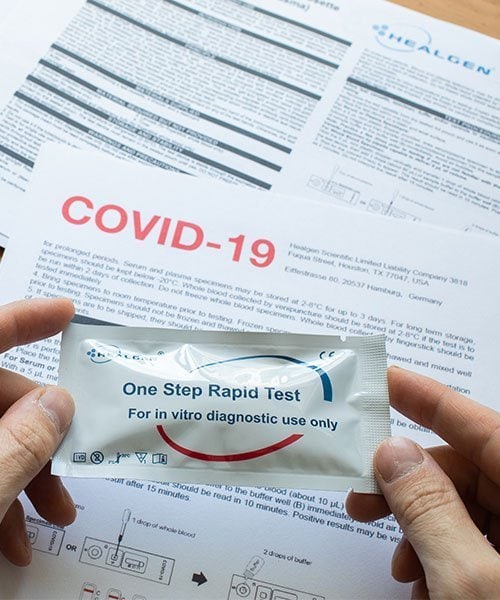Help Stop the Spread of COVID-19 with Rapid Test & Trace Canada
Canada aims to achieve mass COVID-19 vaccination by fall 2021. How do you feel about another year of the current pandemic lifestyle?
Ready for a new approach?
If all goes to plan, the Government estimates only about 50% of Canadians will have received a COVID-19 vaccine in...
Based on the announced target of immunizing more than half of all Canadians by September 2021.
Thank you for considering a new approach
This website is a resource to help you better understand the benefits of rapid testing and tracing. This could be an effective strategy to combat the spread of COVID-19 and get Canada safely back to a normal way of life.
What is rapid testing & tracing?
Rapid testing involves using rapid antigen tests to test large groups of people frequently, regardless of whether or not they are showing symptoms, to identify and stop the spread of COVID-19. Contact tracing involves identifying how contagious people may have spread the virus to others via close contact, testing those people, and then isolating them if they are sick.
Why is mass rapid testing important?
You can help Canada benefit from rapid testing!
Rapid testing is a misunderstood strategy and one that other countries have used effectively to slow the pandemic. With cases on the rise, there is no reason for Canada not to try rapid testing.
Key Considerations
There are multiple strategies for how Canada could efficiently implement mass rapid testing and tracing programs. Our country has the infrastructure and expertise.
The objective of Rapid Test & Trace Canada is to raise public awareness and demand for our governments to form a specialized task force to determine the best way to implement a rapid testing strategy in Canada. Below are a potential scale-up timeline and key considerations for implementing mass testing.
By May 31, 2021
200,000 rapid tests per day
Mix of tests administered by health professionals along with self-administered tests under supervision at sites of congregation
By June 30, 2021
1M rapid tests per day
Rapid tests self-administered under supervision widely available to screen students, employees and customers in restaurants, etc.; Targeted roll-out of home tests
By July 31, 2021
5M rapid tests per day
Mass mailing of rapid at-home tests to households across Canada for biweekly testing; self-administered, supervised tests remain in use for places of congregation
Forget Politics
An apolitical task force should recommend how to roll out programs across Canada.
Test Frequency
Testing 1-2M people/day in specific sectors could help stop the spread in weeks.
Importance of Tracing
Tracing will be key initially, but redundant after universal rollout of rapid testing.
Mass Production
Rapid antigen tests can be locally produced and distributed without a patent in Canada.
Quick Implementation
Canada could be doing targeted mass testing in a month with proper logistics and supply.
Affordability
The estimated cost of a nationwide program is under $2B, less than 0.5% of what the federal government has spent on pandemic relief.
At-Home Testing
Universally available, personal at-home rapid tests will squash COVID-19. Transparent guidelines, sped-up approval, & federal support are needed urgently.
Contact Tracing
Contact tracing is a critical success factor. Canada’s tracing system needs more resources and people to operate it.
Help the Vaccine
The logistical groundwork used to distribute rapid tests could also be used to distribute the vaccine when it’s ready.
Could Canada really stop the spread within weeks?
Rapid tests can be manufactured in Canada and return results in 15 minutes. We owe it to ourselves to at least try a mass rapid testing program.


Mass Rapid Testing & Tracing Can Stop the Spread of COVID-19
Countries like Slovakia and the United Kingdom have established mass rapid testing programs that are showing signs of success.
Stop the Spread in Weeks
A study from Harvard University and the University of Boulder shows that a well-run mass rapid testing campaign along with adequate contact tracing and sanitary measures could almost completely stop the spread of COVID-19 in less than 2 months.
Current Canadian Testing Stats
View the latest COVID-19 epidemiology update from the Canadian Government. Unfortunately, Canada is not administering enough daily tests. One of our goals is to quickly increase daily rapid testing across Canada, starting with 200,000 rapid tests per day by the summer, to 5 million rapid tests per day by fall 2021.
Questions About COVID-19 Testing & Tracing
Why won't Canada have mass vaccination sooner?
A recent poll found that 74 per cent of respondents are worried that the public distribution of a vaccine will be too slow to stop a greater spread of COVID-19 in Canada.
Canada doesn’t have the production facilities required to manufacture the most promising vaccine candidates. This is because both the Pfizer and Moderna candidates are mRNA vaccines – a new kind of formulation that very few facilities around the world are equipped to build, none of which are in Canada.
How do we test for COVID-19 in Canada?
Currently, all COVID-19 tests in Canada must be performed by a health care professional. At this time, the Government of Canada hasn’t authorized rapid, at-home test kits where you collect samples and test yourself at home.
The current testing method in Canada is molecular polymerase chain reaction (PCR) tests, which detect the virus itself and diagnose COVID-19.
Samples for COVID-19 PCR tests are collected in different ways:
- nose swab
- throat swab
- saliva sample
For laboratory-based testing, such as molecular PCR, samples are sent to a laboratory for analysis. It takes 1-5 days to receive results, depending on where you get tested in Canada.
You can learn more by watching this video from the Government of Canada or by visiting their website.
What is rapid testing & tracing for COVID-19?
Rapid testing involves using rapid antigen tests to test large groups of people frequently, regardless of whether or not they are showing symptoms to identify and stop the spread of COVID-19. Contact tracing involves identifying how contagious people may have spread the virus to others via close contact, testing those people, and then isolating them if they are sick.
How long does it take to get COVID-19 test results?
Polymerase chain reaction (PCR) tests are the most common in Canada. These involve an uncomfortable throat or nasal swab and require you to go to a government-authorized testing facility. Your test is then sent to a local laboratory for analysis.
Depending on where in Canada you get tested for COVID-19, it could take 1-5 days to receive the results of your PCR test.
Rapid COVID-19 antigen tests can be self-administered and return a result in 10-15 minutes.
Why is mass rapid testing important?
How are rapid tests different?
Rapid tests, also known as antigen tests, detect proteins either at the surface of the virus, or from inside of the virus that are released after breaking up the virus using a simple soap solution.
These differ from the more common PCR (polymerase chain reaction) tests, which detect the genetic material of the virus.
The key differences between them are processing time and test sensitivity and specificity.
Are rapid COVID-19 tests accurate?
Sensitivity and specificity to detect a particular condition determine how accurate a test is.
PCR tests have the highest technical performance and can detect viral material even when only minute amounts of viral material are present, but they are slow and require a large infrastructure.
Rapid tests reliably detect viral material when it is present in moderate and high concentration, but cannot detect when only minute amounts are present.
Which one is more accurate depends on the goal of the testing.
If the goal is to identify who is infectious (or expressed differently, contagious), then rapid tests are predicted to be more accurate, because they only detect higher concentrations of viruses associated with contagion. They are also much more effective at curbing the spread because they are fast and frequently used.
If the goal is to detect infected individuals, even the ones that have only residual viral material, and who are not contagious, then PCR tests are more accurate.
Because rapid tests are less sensitive than PCR tests, this has led people to criticize them out of concern that some patients may not be diagnosed correctly.
Based on the current performance, rapid tests have been approved to diagnose individuals from the moment symptoms appear up to five days later. Better rapid tests reach 95% sensitivity.
Should Canada stop PCR testing for COVID-19?
NO! Canada should absolutely continue PCR testing, but these should be used alongside a mass rapid testing approach.
But when it comes to public health, Canada should make use of all available tools. It's better to have a less sensitive test with results in 10-15 minutes than a more sensitive test with results 1-5 days.
There is also a huge difference in price, with PCR tests costing up to 10 times more than rapid antigen tests.
Take Action to Save Lives & Safely Reopen Canada
You can help Canada stop the spread of COVID-19 with rapid testing and tracing. Begin by following the steps below to tell our leaders to get started on a solution today!










































